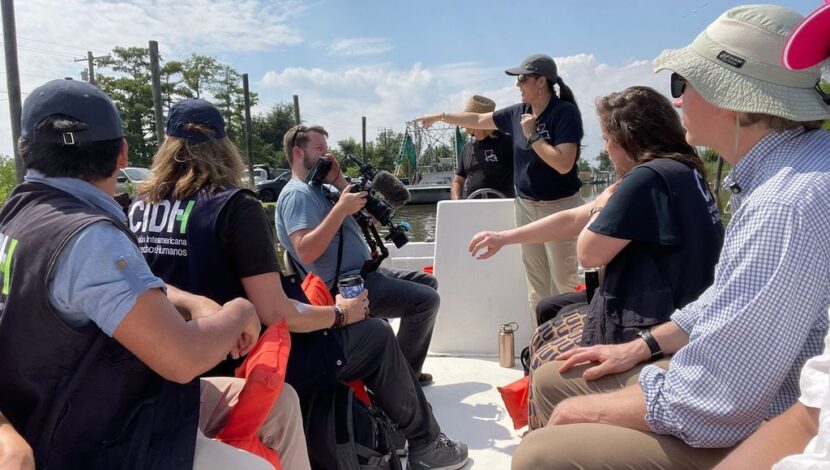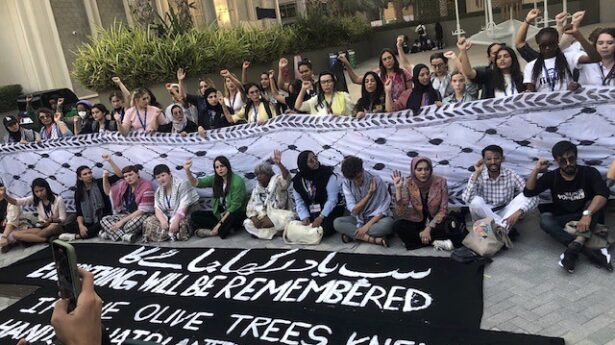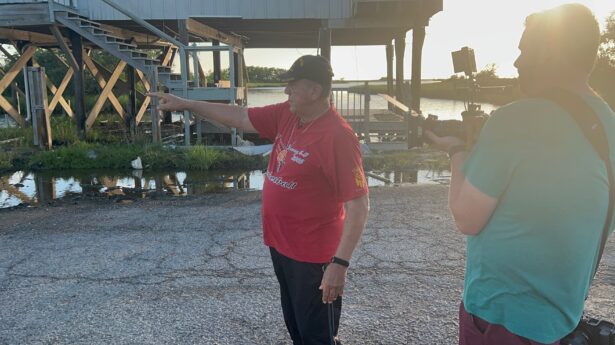The Unitarian Universalist Service Committee advances human rights through grassroots collaborations.
REDESCA: Leveraging Hemispheric Collaboration to Advance Human Rights

By Josh Leach on May 29, 2024
The Task of REDESCA: Speaking Truth to Power in the Americas
When looking for ways to hold the U.S. government accountable for its human rights obligations, we often think of the United Nations. But the Western Hemisphere has its own independent coalition of member states as well, fostering collaboration throughout the region: the Organization of American States (OAS). This body in turn has autonomous human rights organs, much like the UN, which serve to monitor and report on the progress of regional governments in upholding their commitments to human rights.
One vital mechanism to achieve this goal is the office of the Special Rapporteur on Economic, Social, Cultural and Environmental Rights (REDESCA) for the OAS’s Inter-American Commission on Human Rights (IACHR). Much like the special rapporteurs of the UN, REDESCA acts at the behest of communities and individuals in member states across the Americas who report violations of their rights and request a visit from the special rapporteurs to monitor the situation and inform governments of their obligations.
Like human rights observers at the UN, IACHR officials lack independent authority to compel governments to honor their commitments. But they can serve a vital function nonetheless by bearing witness to injustice. Visits of the special rapporteur to communities who are facing human rights violations help ensure that no government in the coalition is able to escape scrutiny for its actions—no matter how powerful that government may be. Despite its historic neocolonial dominance in the region, the United States is no exception.
The Special Rapporteur’s Visit: A Chance to Support Our Partners
UUSC has leveraged visits of REDESCA in the recent past to support our partners’ rights. Roughly a year ago, the previous REDESCA, Soledad García Muñoz, visited UUSC partners in Alaska and Louisiana to investigate reports of systematic discrimination and violations of tribal sovereignty at the hands of the U.S. government. UUSC—and our partners—helped prompt this visit by submitting a formal complaint to the OAS special rapporteur’s office that detailed the government’s unjust treatment of communities facing climate displacement.
Being forced to leave your home because of environmental destruction that you did nothing to cause is unjust. It also violates human rights. Yet, traditional human rights mechanisms often failed to recognize harms like environmental degradation and violations of tribal sovereignty as cognizable issues, limiting their focus to civil and political rights. REDESCA seeks to correct for this lopsided focus—protecting the social, economic, cultural, and environmental rights of communities throughout the Americas with equal rigor.
The right to live in a sustainable climate and to relocate, if necessary, with dignity and self-determination, is one of these economic, social, cultural, and environmental rights. As our partners have said for years, and as REDESCA’s post-visit report helped confirm, the U.S. government violated this right—first through the carbon emissions that caused climate change in the first place, then by failing to adequately consult with affected communities and honor their vision for a dignified relocation to safer ground.
A Path to Higher Ground: How REDESCA Can Serve Our Solidarity Objectives
Since the end of García Muñoz’s second mandate as REDESCA, the IACHR has appointed a new special rapporteur to the position, Javier Palummo Lantes, a human rights attorney and expert from Uruguay. He will be the second person ever to hold the REDESCA office. We welcome him to this role and look forward to deepening our work with him in this position, building upon our collaboration with the former special rapporteur. The REDESCA position serves a vital function that can help us advance UUSC’s objectives throughout the region.
As an organization founded on the principle of global solidarity, UUSC seeks to secure broader recognition of the rights of communities facing climate displacement throughout the Americas—and the world. This requires acknowledging the intersectionality of climate displacement with other forms of oppression: such as racism, colonialism, and patriarchy. Across the globe, Indigenous communities are often facing the worst and most immediate climate effects, due to long legacies of forced displacement and environmental injustice.
The climate-induced displacement of Indigenous communities—which is already affecting our partners in Alaska and Louisiana—implicates a host of social, economic, cultural, and environmental rights: including their right to live in safety in their ancestral homes, and to control the process of relocation if and when it becomes inevitable. UUSC’s solidarity goals, which include promoting the self-determination of tribal communities and securing broader recognition of climate displacement as a rights issue, tie in directly to REDESCA’s mandate.
We therefore look forward to ongoing collaborations with the REDESCA office. No community should ever have to endure rights violations in silence and isolation. The REDESCA helps bring these cases of injustice to light, preventing the attempts of powerful governments to render the suffering of communities invisible. We applaud them in this task and hope the office will continue to serve its mandate with courage. People experiencing injustice and discrimination in the Americas are not alone—the whole hemisphere is watching.
Indeed, on May 27 and May 28, two UUSC partners, Elder Rosina Phillipe from southern Louisiana and Morris Alexie from Alaska, testified before the IACHR in Manaus, Brazil, about the continued impacts of climate change and its effects on their respective communities.
UUSC’s support helped connect both Rosina and Morris to this powerful space and give them the opportunity to testify to the climate change impacts experienced by their communities. Donating to the UUSC Annual Fund is just one way to help Indigenous communities impacted by climate change reach the decision making spaces that help them share their truths and bring about change. Please consider making a contribution!
Image credit: UUSC

